#sslcertificates
Text
Google: SSL Certificate Does Not Boost SEO - Online Technical Guru
Looking to understand the impact of SSL certificates on SEO? Dive into this informative article that explores Google's perspective. Discover why SSL certificates does not boost SEO, and gain insights into their role in website security and user trust. Stay informed and enhance your SEO strategy with valuable knowledge about SSL certificates.
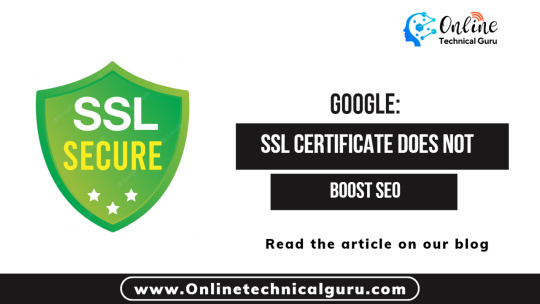
#SSLcertificatedoesnotboostSEO#SEO#SSLcertificates#WebsiteSecurity#Google#SearchRankings#onlinetechnicalguru
3 notes
·
View notes
Text
Best Free URL Shortener
Looking for an easier way to track your marketing campaign and social media? Our new URL shortener helps you make marketing URLs look shorter and more professional. Plus, you'll still be able to track traffic source, volume, and quality of clicks. https://foxly.me/pknw0J

2 notes
·
View notes
Text
Limited Time CLOUD HOSTING SALE - Get up to 30% OFF at Averthost!

Now you can harness the power of enterprise-grade cloud hosting at never-before pricing from Averthost!
Prices starting at just 280 INR/month after discount
Hurry, sale ends soon!
Browse plans and unlock innovation powered by the cloud
www.averthost.com/cloud-hosting-india
#sharedhosting#vpshosting#dedicatedhosting#wordpresshosting#cloudhosting#resellerhosting#managedhosting#domainregistration#sslcertificates#emailhosting#webdesign#webdevelopment#digitalmarketing
0 notes
Text
Importance of SSL Certificates in Website Security
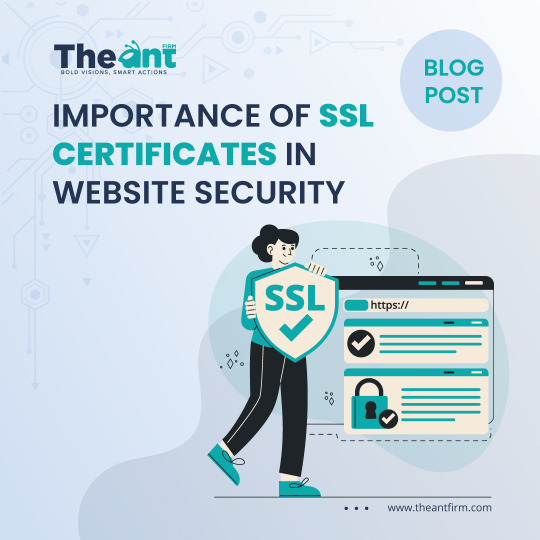
Learn why SSL certificates are essential for website security and how they protect sensitive information. Discover the benefits of having an SSL certificate and why it builds trust with your website visitors.
Read here
#sslcertificate#ssl#sslcertificates#website#websitesecurity#wordpress#webhosting#security#seo#https#websitedesign#theantfirm#the ant firm#webagency#webdesign#wordpress development toronto#branding#webdevelopment#design company toronto
0 notes
Photo
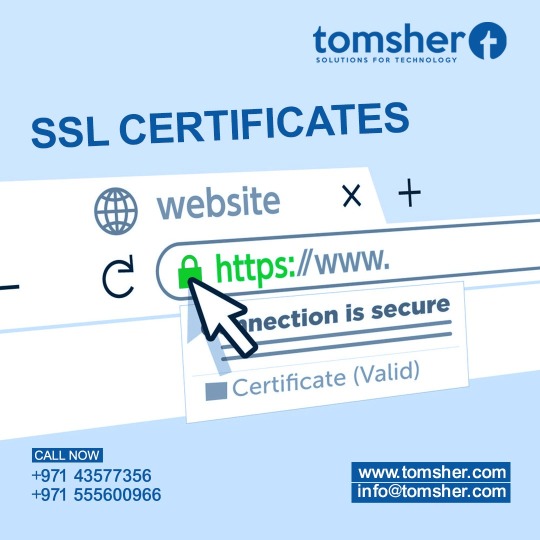
What is an SSL? And why do websites need them?
SSL is the acronym for Secure Sockets Layer. It is a protective layer for websites to ensure the internet connection is secure and safeguard sensitive data sent between two systems.
.
We are an authorized SSL partner of Symantec, Thawte, Comodo, Sectigo, GeoTrust & RapidSSL, and provide trusted SSL Certification depending on your business requirements.
.
.
For more details about SSL certificate please contact
WhatsApp: https://wa.me/971555600966
☎ +971 43577356 📞 +971555600966
📧 [email protected] 🌏 https://www.tomsher.com/ssl-certificates/
0 notes
Photo
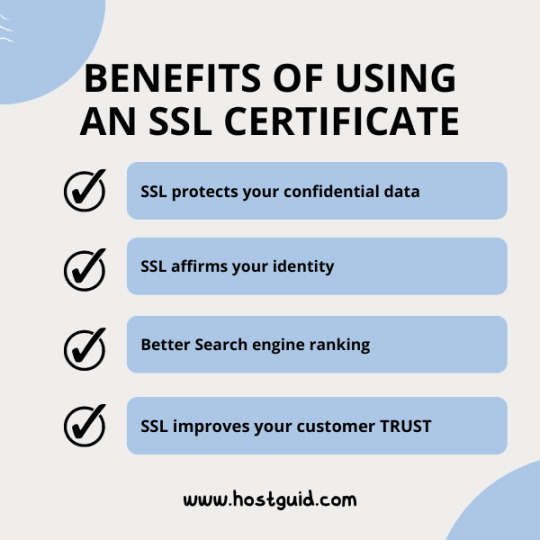
SSL Certificate secures the data which is in transit between server and browser. In simple words, it keeps the information private and secure.
We listed many SSL certificate plans check out:- https://www.hostguid.com/ssl-certificate/
0 notes
Photo

Top 5 Reasons Why You Need SSL Certificates: ✅ keep User Data Secure ✅ Reduce The Risk Of Phishing & Attacks ✅. Convey Trust To Users ✅ Better Search Engine Rankings ✅ Secure Customer Payments Follow For More Tips: Digital Growth World 📲 For More Info, Call: 6393-159-155 #digitalgrowthworld #websitessl #sslcertificates #website #websitesecurity #wordpress #webhosting #hosting #security #digitalmarketing (at Digital Growth World) https://www.instagram.com/p/Cd2VchXNF79/?igshid=NGJjMDIxMWI=
#digitalgrowthworld#websitessl#sslcertificates#website#websitesecurity#wordpress#webhosting#hosting#security#digitalmarketing
0 notes
Text
SSL Certificate. Why You Need An SSL For WordPress
SSL Certificate. Why You Need An SSL For WordPress
SSL stands for Secure Socket Layer. An SSL certificate enables HTTPS encryption for your website and allows secure connection...
#ssl #websecurity #browsersecurity #googlessl #securesocketlayer
SSL stands for Secure Socket Layer. An SSL certificate enables HTTPS encryption for your website and allows secure connection and keeps your and customers data safe by ensuring that all data passing between you and a site is protected against man-in-the-middle attacks.
SSL certificate helps to prevent security breach on your website. This certificate works as digital documentation that verifies…

View On WordPress
4 notes
·
View notes
Text

SSL Certificate in delhi NCR
SSL Certificate in delhi NCR come in different validation levels, including Domain Validation (DV), Organization Validation (OV), and Extended Validation (EV). Choose a provider that offers the validation level that best suits your business needs and budget.
0 notes
Text
Step-by-Step Guide: How to Install an SSL Certificate
In this step-by-step guide, we'll walk you through the process of installing an SSL certificate, ensuring your website's security and building trust with your visitors. From generating a CSR (Certificate Signing Request) to verifying domain ownership and installing the certificate on your web server, each stage is meticulously explained with clear instructions. We'll cover various platforms and hosting providers, making it accessible to a wide range of users. By following these detailed steps, you'll be equipped to secure your website with HTTPS encryption, safeguard sensitive data, and enhance user confidence in your online presence. Let's embark on this journey to fortify your website's security and protect your visitors' privacy.
0 notes
Text
Best Free URL shortener
Looking for an easy way to track your marketing campaign and social media? Our URL shortener helps you make marketing URLs look shorter and more professional. Plus, you'll still be able to track traffic source, volume, and quality of clicks. Try it out now https://foxly.me/RhBl2U

0 notes
Text
What is SSL Certificate? - GoDigital360Degree
Website's security posture with SSL encryption 👩🏻💻🔍🧲
Let's define the spectrum of Digital Marketing with GoDigital360Degree ♾️
instagram
#godigital360degree#digitalmarketing#internetmarketing#definition#knowledgegraph#cybersecurity#sslcertificate#encryption#browsesafe#trustworthy#digitalguardian#cybersafe#secureconnections#Instagram
0 notes
Text
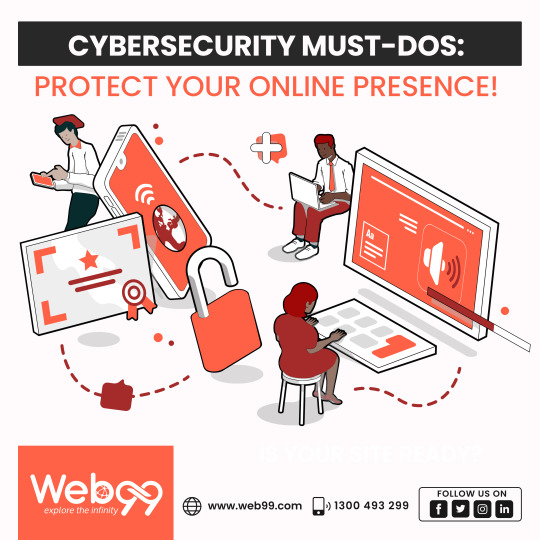
As cyber threats become more sophisticated, it’s imperative to fortify your website with the latest security measures.
A strong cybersecurity posture not only protects your digital assets but also builds trust with your customers.
To safeguard your online presence:
👉 Ensure your software is always up to date to defend against vulnerabilities.
👉 Implement an SSL certificate for secure data transmission.
👉 Regularly back up your website to quickly recover in the event of an attack.
👉 Train your team to recognize and avoid phishing scams.
👉 Use a web application firewall (WAF) to block malicious traffic and attempts to breach your site.
By taking these steps, you’ll significantly enhance your website’s security and resilience against cyber threats.
For more details, get in touch with us today!
Call us on 📞 1300 493 299
0 notes
Text
What is an SSL certificate?
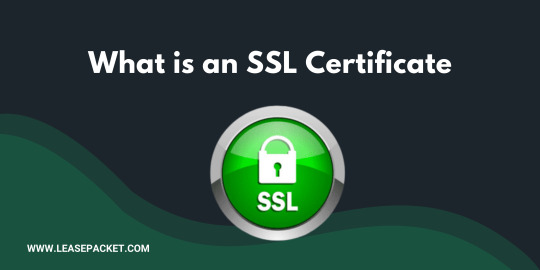
SSL certificates help keeping important stuff safe on the internet and making sure people can trust websites. As the online world gets bigger, it's really important for website owners, managers, and even people using websites to know what SSL certificates are and how they do their job. In this guide, we'll take a closer look at SSL certificates—what they do, how they work, and why they're so important for keeping our data secure.
Understanding SSL Certificate
SSL, or Secure Socket Layer, is like a secret code for making sure our online conversations stay safe and private. When you visit a website with SSL, it uses a special digital certificate to prove it's really the website it claims to be. Plus, it locks up the information you share—like passwords and credit card numbers—in a secret box, so no one else can listen in or sneak a peek. This way, SSL keeps our sensitive details safe from any unwanted snooping while we're surfing the web.
How SSL Certificates Work:
Authentication:
SSL certificates play a crucial role in authenticating the identity of a website. When a user connects to a website secured with SSL, the SSL certificate verifies that the website is indeed who it claims to be. This authentication process is vital for building trust with users.
Encryption:
Once the identity is verified, SSL certificates initiate a secure session by encrypting the data transmitted between the user's browser and the website's server. This encryption transforms the data into an unreadable format for anyone trying to intercept or manipulate it. The use of public and private keys ensures that only authorized parties can decipher the encrypted information.
Data Integrity:
SSL certificates also ensure data integrity by preventing data tampering during transmission. The cryptographic algorithms used in SSL create a unique fingerprint (hash) for each piece of data. This hash is transmitted along with the data, and the recipient can verify its integrity by comparing it with the calculated hash upon reception.
Types of SSL Certificates
Domain Validated (DV) Certificates:
These certificates verify the domain ownership but do not validate the organization behind the website. They are suitable for basic encryption needs.
Organization Validated (OV) Certificates:
OV certificates provide a higher level of authentication by verifying both domain ownership and the legitimacy of the organization operating the website. They are often used by businesses and organizations.
Extended Validation (EV) Certificates:
EV certificates offer the highest level of validation, involving a thorough vetting process to confirm the legal entity behind the website. Websites with EV certificates display a green address bar in most browsers, signifying a high level of trust.
The Importance of SSL Certificates
Security and Data Protection:
SSL certificates are paramount in protecting sensitive data from potential cyber threats. They create a secure environment for online transactions, login credentials, and any other confidential information exchanged between users and websites.
Trust and Credibility:
Websites with SSL certificates inspire trust among users. The visual cues, such as the padlock icon in the browser's address bar or the "https://" protocol, signal a secure connection, enhancing the credibility of the website.
Search Engine Rankings:
Search engines, like Google, consider SSL as a ranking factor. Websites with SSL certificates may receive a slight boost in search engine rankings, contributing to improved visibility and organic traffic.
Compliance with Regulations:
Many data protection regulations, such as GDPR, require the secure transmission of personal data. Implementing SSL certificates helps websites comply with these regulations and avoid potential legal issues.
Conclusion
An SSL certificate is a fundamental component of modern web security, ensuring the confidentiality, integrity, and authenticity of online communications. Whether you're running an e-commerce site, a personal blog, or a corporate platform, integrating SSL certificates is a proactive step towards creating a secure and trustworthy online environment. Stay informed, prioritize security, and empower your website with the robust protection afforded by SSL certificates.
0 notes
Text
To increase you webpage speed, you need to follow these steps,
#pagespeed #pagespeedinsights #seotechnique #websitespeed #sslcertificate #technicalseo #imagecompression #onpageseo #wordpressspeed #newthingsindigital #seo #digitalmarketing #searchengineoptimization #contentmarketing #socialmediamarketing #digitalmarketingagency #sem #onlinemarketing #seotips #socialmedia #digitalmarketing #socialmediamarketing #marketing #digitalmarketingagency #seo #onlinemarketing #marketingstrategy #socialmedia #contentmarketing #digitalmarketingtips #seoemployer






0 notes
Text
Boost Your Peace of Mind with Our Website Security Solutions
If you own a website, your online presence is always at risk of cyber attacks and data breaches. That's where our top-notch website security solutions come in. We offer a comprehensive approach to web security, ensuring protection against vulnerabilities and ensuring a secure website for you and your visitors.
Our expert team is committed to providing you with the latest website security measures, including hacking prevention, SSL certificates, and website encryption. With our solutions, you can enjoy worry-free browsing and focus on growing your online business.
Key Takeaways
- Website security is critical in today's digital landscape
- Investing in comprehensive web security measures can ensure a secure website for you and your visitors
- Hacking prevention, SSL certificates, and website encryption are essential website security measures
- Partnering with an experienced website security provider is crucial for protecting your online presence
- Neglecting website security can have severe consequences for your business, including financial losses and damage to reputation.
The Importance of Website Security
In today's interconnected world, website security is more important than ever. With cyber attacks and data breaches on the rise, ensuring the safety and protection of your website is crucial for your business.
Cybersecurity measures such as hacking prevention and SSL certificates help safeguard sensitive information and protect against unauthorized access. Implementing a solid website defense strategy can prevent potential threats and ensure that your website is secure.
An SSL certificate is an essential component of website security, as it provides an additional layer of protection by encrypting data transmission between a website and its visitors. This not only ensures secure communication but also builds trust with users, helping to maintain a loyal customer base.
Investing in comprehensive cybersecurity solutions, such as firewall protection and intrusion detection systems, can further safeguard your website and data from malicious attacks. Additionally, securing your website's backend, including the server and database, is essential to prevent unauthorized access and potential data breaches.
Regular security audits are also crucial to assess the effectiveness of your website security measures. These audits help identify vulnerabilities and loopholes that may have been overlooked, enabling you to stay one step ahead of potential cyber threats.
Remember, website security is a shared responsibility, and educating users about online safety practices can help prevent security breaches. By promoting cybersecurity awareness among visitors, you can enhance the overall protection of your website.
Don't neglect website security – invest in comprehensive solutions today and ensure a worry-free browsing experience for all.
Understanding Website Vulnerabilities
Website vulnerabilities are weaknesses in a website's architecture or configuration that can be exploited by cybercriminals to gain unauthorized access or compromise data. Being aware of these vulnerabilities is crucial to website protection. Here are some common website vulnerabilities:
Name of Vulnerability
Description
Malware Infections
Malware is malicious software that can be installed on a website or user's device without permission. Malware can be used to steal sensitive data, damage systems, or distribute spam.
Cross-Site Scripting (XSS)
XSS is a type of injection attack where malicious scripts are injected into web pages viewed by other users. This can allow attackers to hijack user sessions, modify page content, or steal personal data.
SQL Injection
SQL injection is an attack that exploits vulnerabilities in a website's database. Attackers can insert malicious SQL code into user input fields, such as login forms, to bypass authentication or access sensitive data.
By understanding these vulnerabilities, you can take steps to prevent attacks and ensure website protection. Regular vulnerability scanning and patching, secure coding practices, and limiting user permissions are some effective measures to safeguard your website against potential threats.
The Role of Website Encryption in Ensuring a Secure Website
In today's digital world, website encryption has become increasingly important in maintaining a secure website. Encryption involves converting plain text data into a coded language that can only be read by the intended recipient.
By implementing website encryption protocols, businesses can protect sensitive information such as login credentials, financial transactions, and personal data from being intercepted. This ensures that only authorized users have access to this information.
The most common form of website encryption is SSL/TLS (Secure Sockets Layer/Transport Layer Security), which encrypts data transmission between the website and its visitors. An SSL certificate is a must-have for any website that collects personal or financial information.
Implementing website encryption not only enhances your website's security but also builds trust with your visitors. By assuring them that their private information is being protected, they are more likely to engage with your website and share their information.
"By encrypting information, you can prevent unauthorized access and protect sensitive data from being intercepted."
Investing in website encryption is a proactive measure towards maintaining a secure website. It is an essential component of a comprehensive website security plan that helps prevent potential cyber threats and ensures peace of mind for businesses and their visitors.
The Benefits of SSL Certificates
SSL certificates are a key component of website security, providing an additional layer of protection for your website and its visitors. By encrypting data transmission between the website and its users, SSL certificates ensure secure communication and build trust with visitors.
When a user visits a website with an SSL certificate, their browser will display a padlock icon in the address bar, indicating that the website connection is secure. This enhances user confidence and minimizes the risk of data interception or theft.
SSL certificates are essential for websites that collect personal or financial information, such as login credentials or credit card details. Without SSL encryption, this sensitive data is vulnerable to interception by hackers or cybercriminals.
Investing in an SSL certificate not only improves website security but also boosts search engine rankings. Google and other search engines prioritize secure websites, so having an SSL certificate can give your website a competitive advantage in search results.
Comprehensive Cybersecurity Solutions
As cyber threats continue to become more sophisticated and prevalent, businesses need to invest in comprehensive website security solutions. Firewall protection, intrusion detection systems, and regular vulnerability scanning are just a few of the measures that can help safeguard your website and sensitive data.
Web security professionals can design a tailored security strategy to ensure that your website remains secure and protected. By utilizing industry-standard cybersecurity practices, your website can stay ahead of potential threats and ensure that your online presence is secure.
Don't wait until a security breach occurs – invest in robust web security measures today to safeguard your business and protect against cybercriminals. Ensure that website security is a top priority for your business by partnering with a reliable and experienced website security provider.
Securing Your Website's Backend
Website security is not just about protecting the front-end; securing your website's backend is crucial to prevent hacking and potential data breaches. By taking proactive measures to secure your server and database, you can ensure that your website is protected from unauthorized access.
One of the simplest and most effective ways to secure your website's backend is by implementing strong passwords. Make sure that all passwords are complex and unique, and avoid using default or easily guessable passwords. Regularly updating software and conducting vulnerability scanning are other essential steps towards website protection.
Firewall protection and intrusion detection systems can also be implemented to provide an extra layer of security to your website. Ensure that your website's hosting provider offers these features and consult with them on best practices for managing and securing your server.
Remember, neglecting the security of your website's backend can have severe consequences. Don't compromise on website security, invest in hacking prevention and web security today.
Importance of Regular Security Audits
Regular website security audits are crucial to ensure your website and data are protected from cyber threats. These audits help you identify vulnerabilities and loopholes that may have been overlooked, allowing you to take proactive measures to address them. By conducting regular security audits, you can stay one step ahead of cyber attackers and prevent potential security breaches.
During a security audit, a cybersecurity expert will assess your website's security measures, including firewalls, intrusion detection systems, and encryption protocols. They will also perform vulnerability scanning to identify any weaknesses that could be exploited by hackers.
Regular security audits are especially important for businesses that collect and store sensitive information, such as financial or personal data. Neglecting website security can lead to severe consequences, including financial losses, damage to reputation, and loss of customer trust.
By investing in regular security audits, you can ensure that your website security measures are up-to-date and effective. This proactive approach to website security can save your business time and money in the long run, while also protecting your customers' sensitive information.
Educating Users about Online Safety
Website security is not only a responsibility of website owners, but also of website users. Educating users about online safety practices is essential in preventing security breaches. As a website owner, you can promote cybersecurity awareness among your visitors by:
- Encouraging the use of strong passwords: Weak passwords are easy for hackers to crack. Advising your users to use complex passwords with a combination of letters, numbers, and symbols can help prevent unauthorized access.
- Avoiding suspicious links: Phishing links can lead to malware infections and data breaches. Encouraging users to avoid clicking on suspicious links can minimize the risk of cyber attacks.
- Keeping software up to date: Outdated software can have security vulnerabilities that hackers exploit. Encourage users to regularly update their operating systems, web browsers, and other software applications to maintain website security.
Remember, website security is a shared responsibility. By educating your users about online safety practices, you can enhance the overall protection of your website and mitigate cybersecurity risks.
Choosing the Right Website Security Provider
When it comes to website security, you need a reliable and experienced provider who can offer comprehensive protection against cyber threats. Don't wait until a security breach occurs – invest in web security solutions today.
Consider the following factors when choosing a website security provider:
- Reputation: Look for a provider with a solid reputation in the industry. Check online reviews and ask for referrals from other businesses.
- Expertise: Choose a provider with extensive experience in website security and a deep understanding of cybersecurity measures.
- Range of solutions: Look for a provider that offers a wide range of website security solutions tailored to your specific needs.
Don't compromise on website security. Safeguard your online presence by partnering with a trusted website security provider.
The Cost of Neglecting Website Security
Website security is not just a luxury but a necessity, neglecting which can have severe consequences for your business. Data breaches and cyber attacks can lead to financial losses, damage to reputation, and loss of customer trust. Moreover, the amount of time and resources required to recover from an attack can be substantial, resulting in a potentially permanent detriment to your business.
A security breach can have a long-lasting impact on your customers, and they may never trust your website again. A secure website not only protects you from financial and reputational losses but also helps to retain customers and attract new ones. Users have become more aware of online security, and they are more likely to trust websites with robust security measures in place.
One of the most significant costs of neglecting website security is the potential for hacking. Hackers may steal confidential data, such as passwords, email addresses, and payment information, which can be sold on the dark web. They may also use your website to distribute malware or launch attacks on other websites, which can result in legal action being taken against your business.
The risk of being hacked increases significantly when you neglect website security. Cybercriminals are continually evolving their methods, and it is crucial to stay ahead of them by implementing proper security measures.
In conclusion, neglecting website security can have severe consequences for your business. It is essential to invest in comprehensive website security solutions to protect your website visitors from cyber threats and ensure a secure browsing experience for all. Don't wait until it's too late; take preventative measures today!
Conclusion
Website security is a crucial component of any business's online presence. Neglecting security measures can have dire consequences, including financial losses, tarnished reputation, and loss of customer trust. By investing in robust website security solutions, businesses can safeguard sensitive information, protect against cyber threats, and enhance user trust.
Effective website security requires a comprehensive approach that includes encryption, SSL certificates, vulnerability scans, and regular security audits. Securing the backend of a website, including servers and databases, is just as important as protecting the front-end.
Choosing the right website security provider is also paramount. It is essential to select a provider with experience, tailored services, and a reputation for excellence. Educating users about online safety practices is another essential step towards enhancing website security.
Don't compromise on website security. Protect your business and website visitors from cyber threats by investing in peace of mind today.
FAQ
What is website security?Website security refers to the measures and practices taken to protect a website from cyber threats such as hacking, data breaches, and unauthorized access. It involves implementing various security protocols and tools to ensure the safety of the website and its visitors.Why is website security important?Website security is essential in today's digital landscape due to the increasing frequency of cyber attacks and data breaches. It helps safeguard sensitive information, protects against unauthorized access, and ensures the trust and safety of website visitors.What are website vulnerabilities?Website vulnerabilities are weaknesses or loopholes in a website's coding or infrastructure that can be exploited by hackers or malicious entities. Common vulnerabilities include malware infections, cross-site scripting, and SQL injections.What is website encryption?Website encryption is a security measure that involves encoding the data transmitted between a website and its visitors. It prevents unauthorized access to sensitive information such as login credentials and financial transactions.What are SSL certificates?SSL certificates are digital certificates that establish a secure connection between a website and its visitors by encrypting the data transmitted. They provide an additional layer of security and build trust with users.What are comprehensive cybersecurity solutions?Comprehensive cybersecurity solutions encompass a range of measures and tools aimed at protecting websites and data from cyber threats. These can include firewall protection, intrusion detection systems, regular security audits, and employee education on online safety.How can I secure my website's backend?Securing your website's backend involves implementing measures to protect the server, database, and other backend components. This can include using strong passwords, keeping software and plugins up to date, and regularly conducting vulnerability scans.Why are regular security audits important?Regular security audits help identify vulnerabilities and weaknesses in your website security measures. They ensure that your security protocols are effective and up to date, helping you stay ahead of potential cyber threats.How can I educate users about online safety?You can educate users about online safety by promoting best practices, such as creating strong passwords, avoiding suspicious links or attachments, and being cautious about sharing personal information online. Educating users enhances overall website security.How do I choose the right website security provider?When choosing a website security provider, consider factors such as their reputation, expertise, and customer reviews. Look for professionals who offer a comprehensive range of security solutions tailored to your specific needs.What are the consequences of neglecting website security?Neglecting website security can lead to severe consequences, including financial losses, damage to reputation, and loss of customer trust. Investing in robust website security measures is crucial to mitigate risks and protect your online presence.
Read the full article
#cybersecurity#hackingprevention#securewebsite#sslcertificate#websecurity#websitedefense#websiteencryption#websiteprotection#websitesecurity#websitevulnerability
0 notes